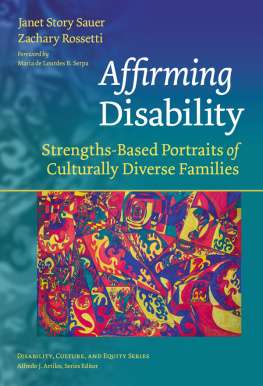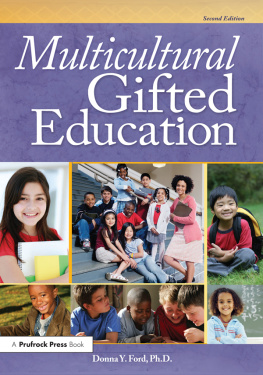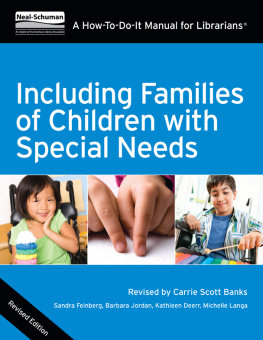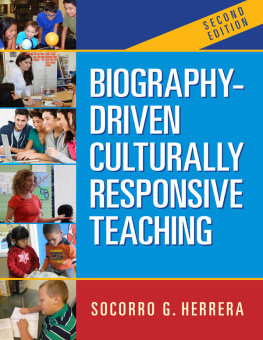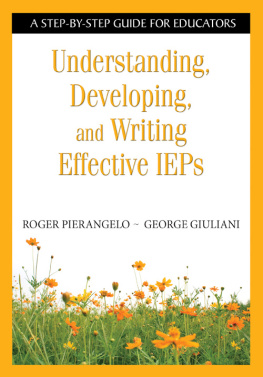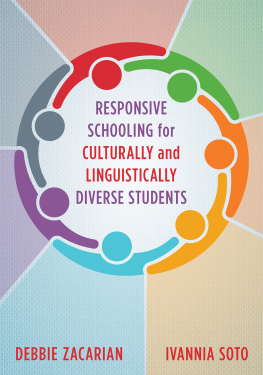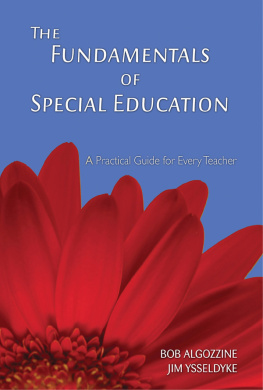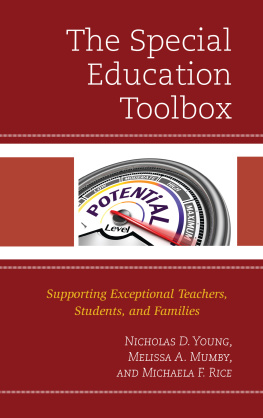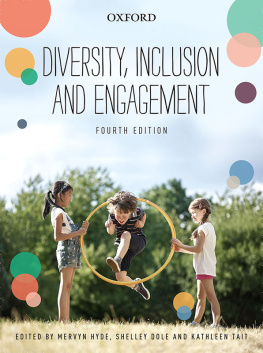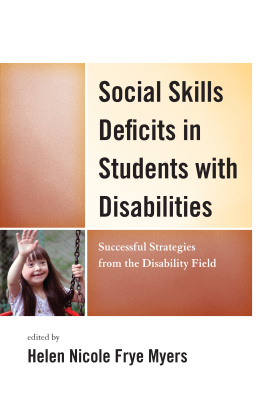Alfredo J. Artiles, Series Editor
Does Compliance Matter in Special Education? IDEA and the Hidden Inequities of Practice
Transition by Design: Improving Equity and Outcomes for Adolescents with Disabilities
A UDREY A. T RAINOR
K EFFRELYN D. B ROWN
D AVID J. C ONNOR , B ETH A. F ERRI , & S UBINI A. A NNAMMA , E DS .
D ANIEL J. L OSEN , E D .
(Un)Learning Disability: Recognizing and Changing Restrictive Views of Student Ability
A NN M ARIE D. B AINES
E LIZABETH B. K OZLESKI & K ATHLEEN K ING T HORIUS , E DS .
Affirming Disability
Strengths-Based Portraits of Culturally Diverse Families
Janet Story Sauer
Zachary Rossetti
Foreword by Maria de Lourdes B. Serpa

Published by Teachers College Press, 1234 Amsterdam Avenue, New York, NY 10027
Copyright 2020 by Teachers College, Columbia University
Cover art: Untitled by Sachin Arora (see ). Photography by Karl Sauer.
All rights reserved. No part of this publication may be reproduced or transmitted in any form or by any means, electronic or mechanical, including photocopy, or any information storage and retrieval system, without permission from the publisher. For reprint permission and other subsidiary rights requests, please contact Teachers College Press, Rights Dept.:
Library of Congress Cataloging-in-Publication Data
Names: Sauer, Janet Story, author. | Rossetti, Zachary, author.
Title: Affirming disability : strengths-based portraits of culturally diverse families / Janet Story Sauer, Zachary Rossetti.
Description: New York, NY : Teachers College Press, 2020. | Series: Disability, culture, and equity series | Includes bibliographical references and index.
Identifiers: LCCN 2019036740 (print) | LCCN 2019036741 (ebook) | ISBN 9780807763292 (paperback) | ISBN 9780807763308 (hardcover) | ISBN 9780807778203 (ebook)
Subjects: LCSH: Children with disabilitiesEducationUnited States. | Immigrant childrenEducationUnited States. | Special educationSocial aspectsUnited States. | Inclusive educatinSocial aspectsUnited States.
Classification: LCC LC4015 .S24 2020 (print) | LCC LC4015 (ebook) | DDC 371.9dc23
LC record available at https://lccn.loc.gov/2019036740
LC ebook record available at https://lccn.loc.gov/2019036741
ISBN 978-0-8077-6329-2 (paper)
ISBN 978-0-8077-6330-8 (hardcover)
ISBN 978-0-8077-7820-3 (ebook)
To Paula Payne,
Whose selflessness, fierce advocacy, determined leadership, and grace under pressure resulted in unconditional love, inclusion, and a full and meaningful life for her son Todd.
To Todd Rossetti,
Who was smarter than most people realized, a loving son and brother, and lucky to have had a mother like Paula.
Their examples honor the families in this book.
Contents
Maria de Lourdes B. Serpa
Susan Ou and Janet Sauer
Oanh Thi Thu Bui, with Zach Rossetti
Maureen Lothrop Magnan, with Janet Sauer
Punita R. Arora, with Janet Sauer and Zach Rossetti
Kimiya Sohrab Maghzi
Sahra Bashir and Amy Gooden
Foreword
I join authors Sauer and Rossetti as a college educator who cares deeply about preparing teachers to effectively educate the students with disabilities of today, who come from all kinds of backgrounds, in partnership with their diverse families. Many of these families are immigrants, speak different home language(s), and are described broadly as culturally and linguistically diverse. Just like the families in this textbook, I am an immigrant: an able-bodied, Portuguese-American woman who came from the Azores, where I was educated as a teacher and taught for a year before coming to and settling in Massachusetts in the late 1960s.
Much like my colleagues, I have many years of experience in special education for immigrant and other marginalized groups of students with disabilities from early childhood to the doctorate level, in diverse communities in the United States, Brazil, Azores Islands, Cabo Verde, Madeira Islands, and Continental Portugal. Unlike the authors, I had to face language barriers and cultural adaptation to a new community environment as an immigrant to the United States. These experiences contributed to my sensitivity to linguistic and cultural factors as I became a bilingual/English learner/special education public school teacher before becoming a special education professor at a Boston-area university.
As a professor for over 3 decades who has lived the experience of being an immigrant, I share the authors passion in their commitment to eliminate special education inequities for immigrant families and their children with disabilities through preservice and inservice teacher education. Moreover, I share and applaud the books emphasis on the change from a deficit approach to a strengths-based vision for transforming special education here and now and beyond.
In Affirming Disability: Strengths-Based Portraits of Culturally Diverse Families, professors Sauer and Rossetti break ground in writing an extraordinary textbook that fills a gap in the field of education. The book is geared toward the preparation of current preservice and inservice teachers, who need to address the learning needs of all students, including immigrants, migrants, special education students, and those from historically underserved groups (Darling-Hammond & Burns, 2017, p. 186). Most teachers in our American educational settings continue to be monolingual and White, and many of their students are multilingual and from diverse linguistic, cultural, and racial backgrounds.
To address the inequities associated with the mismatch between students diversity and their teachers cultural and linguistic backgrounds, this textbook provides a very well-conceptualized, nonhierarchical, research-based learning solution that is inspirational and action oriented. This textbook reads more like an engaging novel in promoting empathy for equity in general and special education for CLD families.
Indeed, this book goes far beyond the case study approach that is used, for example, by Harry, Klingner, Cramer, and Sturges (2007). It is a culturally responsive text that gives voice to the families. It takes advantage of portrait narratives, a much more holistic method where the six immigrant families candidly tell in their own words (na primeira pessoa in my native Portuguese) about the challenging experiences and inequities they face when navigating the special education system in the United States. These families, from six different cultures, express their experiences within their social, cultural, and educational contexts reflecting what, at times, is sad to recognize. Given the change in demographics that has resulted in an increase in the bilingual ELL population with and without disabilities, educators at all levels, more than ever, need to be better prepared to understand the lives of diverse bilingual English learners with disabilities and their immigrant parents.

